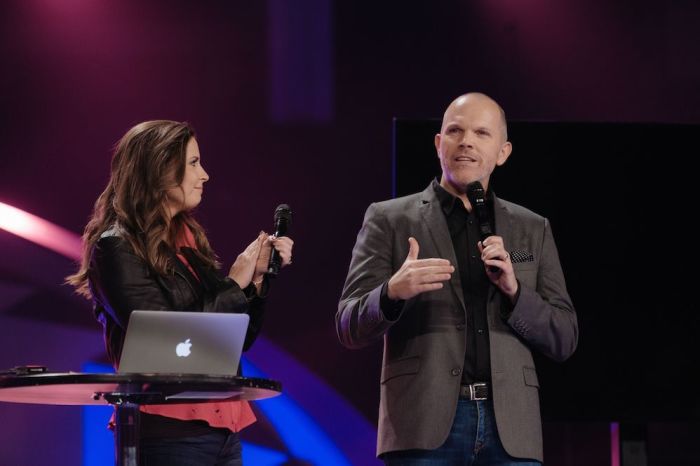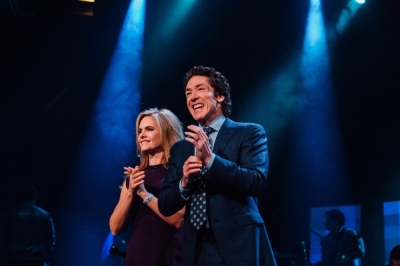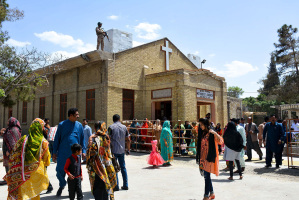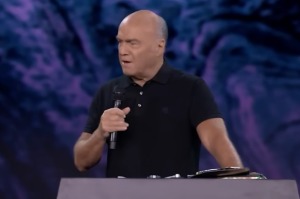Lakewood’s marriage ministry addresses commitment, pride and intimacy at Spark Conference

Marriage Pastors Clayton and Ashlee Hurst share what they’ve learned in their own relationship and what they see as the biggest threat to marriage in an interview with The Christian Post.
Lakewood Church is hosting their popular Spark Marriage Conference Friday and Saturday, and the Hursts are leading the event.
Thousands of people across the United States have traveled to Lakewood Church in Houston, Texas, over the past four years to attend the two-day conference, which features nationally recognized speakers, and offers tools and resources to help couples build a strong union.
This year’s Spark Marriage Conference will feature relationship experts, including author of the international best-seller Love & Respect, Dr. Emerson Eggerichs; award-winning film producer Devon Franklin; stand-up comedian Michael Jr., and many others.
Clayton and Ashlee Hurst, marriage pastors at Lakewood Church, say they are not afraid to tackle the hard topics of marriage because it’s needed. Below is an edited transcript of The Christian Post's interview with the Hursts. They share marriage advice and call out what they believe is the primary issue behind every failing relationship.
CP: What would you say is the state of marriage in this day and age?
Clayton: I think for us and what we're seeing is that people are more open than ever before to get the help they need. I think they realize that maybe what was modeled to them growing up — whether it's in their family or seeing a neighbor or something like that — they might have seen it as less than what God ultimately intended it to be. But I think what we're seeing in this new generation and even with people who've been married for a while, is people are more willing to find and get the help to help them right where they are right now.
For Ashlee and I that was really our story. We kinda felt like we should be the poster kids for having a successful marriage because of what we saw growing up: grandparents married over 60 years, parents married well over 50 years.
And I think we kind of just assumed that this was an easy thing because we never saw people fighting, everybody was always smiling at church. We just kind of assumed that, "we don't need premarital counseling, this is going to be easy."
We found ourselves five years into marriage, just in really a valley of hopelessness. I was a new children's pastor at our previous church, and we were embarrassed to open up to people and ask for help. So I see this new generation and more and more people more willing, at least for right now, asking for that help and saying, "You know what, I didn't even realize I needed that help but now hearing about it, there are some things that we could tweak, there are some things that we could learn and grow from."
Ashlee: There is also a generation that's fearful of marriage, maybe because of what they've seen in society or with their parents. I think they're afraid of the commitment because of problems that it could create. But marriage doesn't create problems, it reveals problems. It reveals those things of yourself that the Lord wants you to work on. It's a great chance to not only become a student of yourself but a student of your spouse as well. When you both decide to go on that journey of "OK Lord, what do I need to work on in myself? What can I change about myself? How can my spouse help me with that?"
It's this beautiful journey that the Lord can take you on but I think a lot of times, people, especially this generation, see it as this commitment, kind of like a trap that there's no way out, "So I don't even want to get in it."
But if they really see it the way God created it as this union between two people that have this opportunity to really work out the issues of their inner soul, it can be this beautiful thing. That's why we want to provide a space at our church where there's just ongoing help in marriage. We not only have our Spark Conference but we have ongoing classes every week — premarital, marital — we offer free counseling at our church. We also do a retreat every year, we've done marriage missions trips; we want to always provide something for couples no matter where they're at in their marriage.
CP: What's your goal for Spark? How did it come about?
Clayton: We have prayer in the middle of our service, every service, and we realized about five years ago that a lot of people are coming forward asking for prayers for their marriage. With the size of the church, we knew that people didn't necessarily know who we were or what we did. So we started asking some questions. We talked with the person that oversaw the prayer ministry and we said, "Have you ever done research to find out what's the number one prayer request every weekend?"
They had just done a survey and she sent it to us. Lo and behold, the number one prayer request every single week in our church was for marriage. We realized there's something to this. At that time, we had just taken over the marriage ministry and we were wanting to go to a conference ourselves, just to make sure we were guarding us and to learn and grow, and we couldn't really find one at a different church.
We just kind of had the idea and we felt like it was from God. What if we made Houston a destination location and we brought in some of the best communicators and marriage experts to one location? That way people could come here and get strength and find hope for their marriage. We proposed it to leadership and they loved it and we just began that journey. This year will be our fourth one.
What we're hoping people gain from it is that regardless of whether they just need some tweaks, if they just need some tools, if they just need hope right there where they are, it really doesn't matter how long you've been married, there's always new things that you can learn and grow about.
I think what's interesting is what we hear from couples every year after they leave and we get surveys back. People tell us, "We came with our divorce papers and we ripped them up, and we realized there's tools and resources that we can utilize and grow from." That's what we hear a lot.
Ashlee: A lot of times in church there's this stigma where, "We'll go to premarital classes" but then after that it's, "We can't go and get help now, we should have it all together." And we wanted to provide a place like, "Hey, no, you need to consider your marriage as an ongoing educational course. You're going to change, your spouse is going to change; you're going to go through things in life that are hard and difficult."
We want to provide a place where you can get some tools in your tool belt, with some of the top marriage experts in the country and go away stronger than when you walked in. It's OK to walk in with issues and problems and to seek out help. That's what the church is for.
We want to make sure that specifically in marriage that it's an open door at Lakewood church. If you need help in your marriage, come to us, we want to help. There is no topic that's too embarrassing or too shameful to seek out help.
CP: What are some of the things you've learned in your marriage when having struggles?
Clayton: I think for us, what we realized is how we take in information, how we process that information, and then how we turn around and give that information back out. Just in how our minds work they are so completely different. Ashlee and I talk about this a lot; I've always been intrigued by how her mind works. In fact, it makes me tired. I will ask her, "Does your mind ever shut off?" And she goes, "No, that would be weird." And I'm like, "that's weird to me that it doesn't." So just having those open conversations just about the complete differences about your spouse.
You're really on an expedition to find out more about your spouse. I think a lot of times we forget that. We'll have conversations, she'll ask a question about any topic and I'm curious about how that question came about. She's like, "Oh, you don't want to know, because I was thinking about this and when I was thinking about that ..." I'm like, "I'm exhausted just hearing about that."
Then she'll ask me, "Hey, what were you thinking when you said this? Or when you said that?" It's like, "Well, I was kind of in my nothing box, I wasn't really thinking about anything." She finds that completely foreign to her.
So there's this mutual respect of how God created us but yet, "How can you not be like this?" or "How can you not think like this or speak like this?" or whatever.
One of our biggest issues in that was me always thinking that, when she would share something with me early on in our marriage, I assumed that she wanted me to fix her problems. No one told me as a man, growing up that, "Your wife is going to process things externally like you process things internally. So don't try to fix her problems, she probably just wants you to listen and tell her it's going to be OK."
Nobody ever told me that, so we got into some of our biggest arguments early on in our marriage because she would tell me all the things that went wrong with her day and I would immediately jump in and try to become Superman and save the day and she would be like, "I don't need your help, I was just talking, I just want you to listen."
The differences between men and women have obviously been fascinating over the years, but it's also becoming a student not only of yourself but also becoming a student of your spouse and learning and growing over the years.
My mom attended our conference two years ago, on their 55th wedding anniversary. I was saying, "Mom, why are y'all coming to the conference, you've been married 55 years, you need to go on a cruise or travel or whatever."
And I'll never forget it, she said, ''Clayton, the moment we stopped learning it will be the day we stopped growing in our marriage." I was like, that's something that will probably always be out in front of us — that we'll always be learning and always be growing to get stronger and get better.
Ashlee: There's a scripture that we always talk about, Proverbs 24:3-4, that says, "By wisdom, a house is built and through understanding, it is established and through knowledge it's rooms are filled with beautiful jewels." That's such a great scripture for marriage and your family.
If you don't build your house on God's wisdom, understanding and understanding your spouse and their perspective and where they're coming from, and then get the knowledge from books and mentors and other people, there's no way your house is going to make it.
One other example I was thinking of for Clayton and I, Clayton was really great at wooing me before we were married. The love languages are universal, it's so important and we didn't know when we got married what our love languages were. So before we got married, because he was trying to woo me, my love language was quality time. So he spent time talking to me and taking me on romantic dates and asking me questions. But after we got married that completely stopped.
For instance, when he would come home from work, I would start asking him all these questions. "How was your day? What did you do?" His love language isn't quality time, so he felt like I was interrogating him as if he was doing something behind my back. So he just wouldn't answer. It was just, "fine, great," nothing big. I was like, "I need conversation, don't you love me enough to talk to me," was the thing I was thinking. He was thinking, "Why does she need to know all this information, what does she think I'm doing all day?"
When we took the time to learn the love languages, and read the book by Dr. Gary Chapman and understand, "Oh, she needs that, that's how I can show her love, she needs that conversation." That was so huge. And when I found out his love language was words of affirmation, I realized OK, I need to make sure I'm telling him thank you, and sending him sweet notes and reminding him how much I love and appreciate the things that he does for me. Because he loves to love me by acts of service, you know, doing things for me all the time, I need to remember to tell him, "Thank you for that and how much I appreciate it."
Things like that are so simple, but yet if you don't know these things, if you don't take the time to get the wisdom, there's no way your marriage is going to make it. You've got to become a student of human behavior of not only yourself but of yourself as well.

CP: What have you learned about marriage from watching your pastors, Joel and Victoria Osteen, who've been married for 32 years?
Clayton: I love something that Pastor Joel said last year. We convinced them to be a part of our conference last year, and they did a Q&A, just to answer some questions about each other.
The thing I love about them is, one, they're the same on the stage as they are off the stage, and that's a joy to be able to say that. The second thing is, Joel said something that I thought was amazing, which is, "Don't go looking for someone." Let's say your spouse has got 80% of what you need, don't leave that spouse going to look for that 20% in someone else, because you got to realize that that person is going to be lacking some things too.
He said, enjoy and love what God's given you and who God's given you. And love that 80% because there's probably something that you're lacking that your spouse needs as well, but that's where God makes up the difference.
I love what Victoria said, she said, don't try to fix your spouse, your spouse is not broken. And I think a lot of times we try to fix from the outside in, but God fixes from the inside out. So love them for who they are and where they are right now, and let God do the fixing.
Ashlee: Another thing that Pastor Joel has said before that has always really stuck with me, and I think it's so key, he said one time in a sermon — and I've seen him walk this out with his wife — he said, "Humility is the key to healing in any relationship."
From all the different couples that we've talked to and counseled over the years, usually the top three issues in any relationship is usually about finances, communication or intimacy. But always, always, always, no matter what the issue is, it always boils down to pride. Always!
No matter what situation we hear about, there's always some root of pride involved, of somebody saying, "Well, yeah, they've done this and this and this, and I'm not willing to forgive them, or I'm not willing to just dismiss it."
Anytime we start a conversation with any couple we always start with, "Are you willing to do whatever it takes to have the marriage you've always hoped and dreamed of?"
They always say "yes." But then when we hear their issue and we're like, "OK, well, this is probably an area that you need to change."
They say, "Whoa, wait a second, why do I have to change that?"
Well, you said you're willing to do whatever it takes to have the marriage you've always hoped and dreamed of. It really boils down to humility.
James 4:6 says God opposes anyone who's proud, anyone, even if you're right. We tell that to couples all of the time. You still need to humble yourself, you still need to let go of the pride of being right. It's not about who's wrong or right, it's about what's right in this relationship, what's right for your marriage.
That scripture goes on to say that God blesses those who are humble with His undeserving grace. God blesses those who are humble. So regardless of whether you're right or wrong, if you're the one that decides to humble yourself, God says that He'll bless you with His undeserving grace, which goes right along with what Pastor Joel said: "Humility is the key to healing in any relationship." We tell that to couples over and over and over again.
Start with humility in every situation. If you're about to go into a conflict, start with humility. Start by telling your spouse how much you love them, and appreciate them, and honor and respect them before you go down the rabbit trail of the issue in the marriage.




























